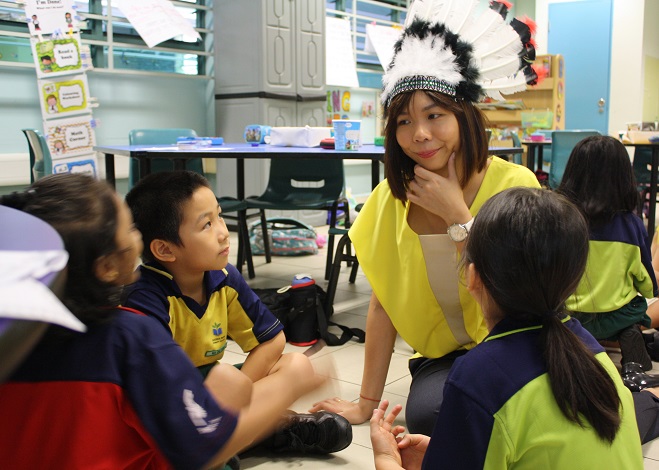Faith Huang, Farrer Park Primary School, Outstanding Youth in Education Award 2017 Recipient
“Why did you do that to Willy?” I came to a standstill amidst the lively role-playing and participation of the class. With his hand still raised, eyes looking straight at me, the boy who barely spoke in class had taken me totally by surprise with his question. Tom* had never raised his hand to ask or answer a question. No one knew about his condition at the time, but he was suffering from Generalised Anxiety Disorder. We only knew how hard it was to get through to him.
I had gotten the class to do some role-playing and I played the role of Buster Nose, a bully, while my students pretended to be classmates of Willy, one of Buster Nose’s victims. They were totally immersed in their roles. I had never imagined that Tom, who seemed to be in a world of his own and uninterested in role-playing could be compelled to ask a question.
At that moment, I realised that every child – even the quietest ones – has a voice and is yearning to be heard. They will participate as long as the environment is safe and encouraging.
Providing a Safe and Encouraging Learning Environment
Over the next few lessons, Tom actively worked with his friends to present their ideas to the class. Through drama, he found his voice and grew in confidence. He graduated last year and is now in a secondary school.
The lesson on ‘Willy and Hugh’ involved an approach I am passionate about: Process Drama. Through Process Drama, teachers and students create fictional characters and settings. They use these to explore complex issues without worrying about real-world consequences. As students take on different roles, they see things from multiple perspectives.
Sometimes, students get to create their own characters. In a lesson called, ‘The Hungry Giant’, my class created profiles of the giant and his family. They decided he was actually a baby giant, with even larger parents. Their contributions helped to steer the direction of the story and lesson.
Process Drama allows me to help my students grapple with moral issues through developing empathy for the characters. A student, annoyed with the greedy, ungrateful wife in a story entitled, ‘The Fisherman and His Wife’, suggested that the fisherman “should change his wife.” I was shocked to hear that from an eight-year-old, but went on to lead the class in a discussion of what it meant to “change” wives.
I also got them to consider how the couple’s children would feel. Following that, another student said that the fisherman should forgive his wife and give her another chance. I was encouraged by how he could confidently express his view on the importance of reconciliation.
Of course, students do not only discuss the stories verbally – they have writing assignments too. However, they may not always know how to put their creative ideas into words. So I get them to do “freeze frames”, where they pause and hold their positions in the midst of acting out a scene, allowing them to reflect on the perspectives of characters involved. After doing the freeze frame, I would invite them to re-enact the scene in slow motion, while narrating the actions and emotions of the characters their friends are playing.
It is a gruelling but rewarding process. By using the frames, and watching their friends use them too, students build the confidence to speak up and learn from one another.
Beyond its benefits in the classroom, I believe that theatre can contribute to society by connecting people and bringing joy to them. With this in mind, I initiated a project for my school’s Drama Club to reach out to visually and hearing-impaired students at Lighthouse School over a period of two weeks.
Through conversation starters and games, club members found out these students’ likes, dislikes and personal stories. They then used the information to put up a short performance for the Lighthouse School students.
Cultivating Empathy through Stories
Empathy can also be cultivated through literature. I started a book club in my Primary 5 class, spending ten weeks exploring the key themes of RJ Palacio’s ‘Wonder’. It describes how an eleven-year-old boy with a deformed face adjusts to school life.
The book’s messages on cultivating friendship and family relationships, bullying, accepting differences, and showing kindness resonated with the students. Upper Primary students often face friendship issues that they do not know how to deal with. At times, these issues could affect their performance in school.
The book club discussions helped my students to love and value themselves, and to embrace others who are different. They made a more conscious effort to listen to one another with not just their ears, but their hearts.
Through drama, my students have learnt that people are all wired differently and we need to adapt our communication styles accordingly in order to connect with them effectively. As one of my students once said in our drama lesson, “You can have monster friends and human friends. You must talk like a monster to your monster friends, but when you talk to humans, you cannot yell.”




.jpg)

